Developing Algo Trading Systems in C++
The Zorro platform accepts 4 types of scripts in the Strategy
folder: lite-C code (.c), C++ code (.cpp), lite-C executables (.x),
and DLLs (.dll). The 64-bit version Zorro64 has no lite-C
compiler and thus accepts only
.cpp and .dll scripts. Scripts of supported types appear in the
[Script] scrollbox and run automatically
when the [Test], [Train], or
[Trade] button is clicked.
Zorro S can compile .x and .dll
files from c. and .cpp sources automatically. For compiling
.cpp scripts it utilizes the Visual Studio™
VC++ compiler. Theoretically other languages can
also be implemented, such as C#, Java, Pascal, Delphi, or Basic, as long
as they are able to generate a 32- or 64-bit Windows DLL. The included batch and
header files in
Source\VC++ can serve as templates for integrating other languages.
When should you use lite-C and when C++? Most scripts and strategies have a
simple structure, and lite-C is absolutely sufficient. But as soon as a script
becomes more complex end exceeds 100 lines of code, you might want to switch it
to C++. Using C++ as script language has many
advantages. Additional development tools, such as the Visual Studio debugger and
profiler, are available. External libraries, such as Boost, can be
integrated without a wrapper. The 64-bit mode has access to the whole PC memory
for backtests. All lite-C functions and all system variables can still be used,
but additionally you have C++ classes and templates at your disposal. Error
handling is more strict and you'll get warnings about bad code style. The VC++
compiler is a bit slower than the lite-C on-the-fly compiler, but is only
invoked when the script was changed. The resulting code runs equally fast or -
in 64 bit mode - even faster. The only disadvantage is that you have to install
the free
Microsoft Visual Studio™ 2022
or above.
The Visual Studio Debugger can display local and global variables,
can profile code execution, and can step into code
without the need of watch statements. Use if when you It is better suited than lite-C for finding
hidden bugs or crashes in
the code. However for finding bugs or flaws in the trading logic, the
Zorro visual debugger
is still the best way, and works with C and C++ projects as well.
Getting started with C++
You can get the free Visual Studio Community Edition from
https://visualstudio.microsoft.com/de/downloads. Install it with its C++
desktop applications enviroment. Locate its build path - that's the folder containing
the file
vcvars32.bat, normally "C:\Program
Files\Microsoft Visual Studio\2022\Community\VC\Auxiliary\Build" -
and enter it in
ZorroFix.ini. This enables Zorro S to directly compile and
start C++ scripts, and automatically generate a VC++ project from a script.
You can use C++ also with the
free Zorro version. It's a bit more complicated though. For any script you need
to set up a DLL project as described below, and use the Visual
Studio IDE to compile your .cpp script to a DLL in the Strategy folder. DLLs are
supported by the free version. Only for debugging it with Visual Studio, you'll
really need Zorro S.
The VC++ compiler and linker options can be
found in Source\VC++\compile.bat and compile64.bat. They are set up for Visual Studio 2022, but
should also work for 2017 and 2019.
When you know what you're doing, you can edit the batch files and modify the
compiler or linker options for enabling special code optimizations or linking additional
libraries. If you are unfamiliar with the VC++ command line options, leave the files
untouched.
The 32-bit Zorro version compiles 32-bit DLLs, Zorro64 (see
Setup) compiles
64-bit DLLs. When you switch between 32 and 64 bit versions, delete the old
.dll
file and compile it again. Or use different names for 32 bit and 64 bit .cpp
scripts. A 64 bit program cannot load a 32 bit DLL, and vice versa.
DLLs can be used not only for developing strategies, but also for extending
the lite-C language with external packages (see using
DLLs). The code syntax for strategies in C++ is similar to
lite-C; the
example file MyStrategy+.cpp contains C++ versions of some of
the included scripts.
C++ vs. lite-C: Code differences
Lite-C contains 'abbreviations' to make code shorter and less complex. Most
of them work also with 'real' C++. Therefore a .c script looks
normally almost the same as its .cpp equivalent. But the
emphasis is on 'almost'. When converting to C++, please mind the differences in
the list below. Most incompatible statements will be anyway indicated with a
compiler error, but not all - see below. For conversion
the other way, see lite-C for C/C++ programmers.
// lite-C strategy (e.g. "test.c")
function run()
{
vars Prices = series(price());
vars SMA100 = series(SMA(Prices,100));
vars SMA30 = series(SMA(Prices,30));
if(crossOver(SMA30,SMA100))
enterLong();
if(crossUnder(SMA30,SMA100))
enterShort();
}
|
// C++ strategy (e.g. "test+.cpp")
#include <zorro.h>
DLLFUNC void run()
{
vars Prices = series(price(0));
vars SMA100 = series(SMA(Prices,100));
vars SMA30 = series(SMA(Prices,30));
if(crossOver(SMA30,SMA100))
enterLong();
if(crossUnder(SMA30,SMA100))
enterShort();
}
|
Include <zorro.h>
If lite-C scripts have no header, the <default.c> header is
automatically included. C++ scripts always need the header <zorro.h>:
#include <zorro.h> // C++ header
...
Exported and void functions
If a function does not return something, it must be defined with the
void
type. This is optional in lite-C, but mandatory in C++. If functions are
exported by the DLL - such as run, main,
objective, etc - define them with the DLLFUNC
macro. The function keyword is defined as DLLFUNC int
in C++; functions of function type must therefore return a
value.
function click() { ... } // lite-C
DLLFUNC void click() { ... } // C++
No variable initialization
The lite-C compiler initializes all global and local variables and arrays to
0; a normal C++ compiler does not. This means they have random
content at start. So take care to properly initialize all variables when
necessary (normally also recommended in lite-C code!):
var MyArray[10]; // lite-C; automatically initialized to zero
var MyArray[10] = { 0,0,0,0,0,0,0,0,0,0 }; // C++
Less parameter omitting
Some functions, for instance the date/time and price functions, can be called without
parameter in lite-C. The lite-C compiler replaces the missing parameter with 0.
Not so in C++. Pass the required parameters.
int CurrentMonth = month(); // lite-C; missing parameter is assumed zero
int CurrentMonth = month(0); // C++
var Close = priceC(); // lite-C
var Close = priceC(0); // C++
Less automatic type conversion
In lite-C, 32-bit integer types or pointers like char*,
void*, int, long, DWORD
etc are converted into each other without explicit typecasting. Not so in C++. Use typecast
operators, either in C style or (preferably) in C++ style.
The intptr_t type converts to a 32-bit word or a 64-bit word
depending on the platform:
int Pos = brokerCommand(GET_POSITION,Asset); // lite-C
int Pos = brokerCommand(GET_POSITION,(intptr_t)Asset); // C++, C style
int Pos = brokerCommand(GET_POSITION,static_cast<intptr_t>(Asset)); // C++ style
Early comparison abort
In lite-C, the order of expressions in a comparison does not matter. In C/C++,
comparisons with && or || are order sensitive.
The comparison is aborted when a && is encountered and the
expression so far evaluated to false, or when a ||
is encountered and the expression evaluated to true. This can
cause a different behavior when the comparison contains function calls:
if(test(x) && test(y)) .. // lite-C always calls test(x) and test(y)
if(test(x) && test(y)) .. // C++ calls test(y) only when test(x) returns nonzero
String vs. char* vs. const char*
In lite-C, there's no difference between strings, char pointers, and constant
char pointers. In C++, string is defined as char*,
and cstr is defined as const char*. Both are
different types. string Name = "Sherlock"; // lite-C
cstr Name = "Sherlock"; // C++
If a function expects const char* and you want to pass a string, use the
(const char*) typecast. Vice versa, if you have defined a
string constant like "ABCDEF" and you want to pass it to a
function that expexts a string, use the (string) or
(char*) typecast.
Different string comparing
In lite-C, strings can be compared with string constants using the normal
comparison operators, such as ==, !=, or
switch...case. In the C++ DLL headers, a string is
a char*
pointer. Comparison with '=' will not give an error message,
but will always result in false - the is the number one reason
of misbehavior when converting a lite-C script to C++.
Either use C++ types like CString or basic_string
for string handling (but make sure to call lite-C functions always with C-style,
null-terminated strings), or use the str... functions from the
C library.
if(Algo == "TRND") ... // lite-C - will silently fail in C++!!
if(strstr(Algo,"TRND")) ... // C++
Different bool size
In lite-C, bool has a size of 4 bytes, in C++ it's 1 byte. The
lite-C bool type is equivalent to the C++ BOOL
type. For avoiding confusion, you might prefer to use int
instead of bool or BOOL.Different pointer size
In lite-C a pointer has always a size of 4 bytes. In C++ it can have 4 or 8
bytes, depending on whether you compile with Zorro or Zorro64.
Consider this when coding pointer arithmetics. The predefined variable types
size_t and intptr_t also change between 4 and
8 bytes. Make sure to recompile DLL-based strategies when using a newer or
different Zorro version, since the size of global structs may be different. Different constant precision
Both C+++ and lite-C have the same precision for variables, but not for constants
directly written in the code. In lite-C, floating point constants are
interpreted with 7 digits
precision, in C++ with 14 digits.
printf("\n %.10f", 0.55555555); // lite-C prints 0.555555555224
printf("\n %.10f", 0.55555555); // C++ prints 0.555555555000
No watch()ed variables
Zorro's single-step debugger can still be used with a DLL, and the
watch statement can still set breakpoints or
identify script crashes, but its variables are
ignored. Use printf()
or
print(TO_WINDOW,...) instead for printing variables.
watch("My Variable: ",MyVar) // lite-C
print(TO_WINDOW,"\nMy Variable: %.2f",MyVar) // C++
Colliding definitions
Many lite-C variables and flags are pre-defined in variables.h
and trading.h. If you're using a C++ library with a function,
variable, or flag that has the same name, undefine the lite-C keyword with an
#undef
statement after including zorro.h and before including the
headers of your library. Otherwise you'll get compiler errors. Calling
external DLL functions
In lite-C, the API macro imports functions from a DLL library.
In C/C++, use the LoadLibrary and GetProcAddress
standard functions for that:
int __stdcall MyDLLFunction(double a,double b);
API(MyDLL,MyDLLFunction) // lite-C
int (__stdcall *MyDLLFunction)(double a,double b);
HMODULE DllHandle = LoadLibrary("MyDLL"); // C/C++
if(DllHandle) {
*(FARPROC*)&MyDLLFunction = GetProcAddress(DllHandle,"MyDLLFunction");
...
}
...
if(DllHandle) FreeLibrary(DllHandle);
Lite-C libraries
Some lite-C libraries such as profile.c or r.h
contain function bodies, so they can be included in the main strategy code only,
but not in multiple source modules.
Click and evaluate
In lite-C, click and evaluate
functions could be triggered by button clicks even after the script run, as long
as no other script was selected. DLL functions can only be triggered while the
script is running.
Using other languages
You can write strategy DLLs in any language that supports 32-bit or 64-bit dynamic link
libraries. In that case you must write new headers and a
ZorroDLL.cpp version in the new language. Aside from the DLL entry point that is unused, it
contains a zorro() function that is called upon strategy start,
and receives a pointer to the GLOBALS struct. The
GLOBALS
struct is defined in trading.h. It is a singleton with all
predefined variables and functions. Its Functions pointer leads
to a list of addresses of all Zorro functions in the same order as listed in
functions.h. The functions must be called with __cdecl
calling convention.
When importing the GLOBALS struct, set up the compiler so
that it does not pad the struct with dummy elements for aligning the struct
members. If available, use a #pragma or similar statement to set the struct
alignment to 4 bytes or below for all structs in the trading.h
header. This is needed to ensure that the structs have identical size in your
DLL and in Zorro.
VC++ setup for a DLL project (free Zorro version)
If you own Zorro S, you need not read this chapter, since Zorro S
automatically generates a VC++ project file (*.vcxproj) when
compiling a C++ script in the Strategy folder. You only need to click on it for
invoking the Visual Studio environment. However with the free version, you need to set up a VC++ project
for any C++ script. The dialogs shown below are for Visual C++ 2017, but for
later versions like VC++ 2019 and 2022 they are very similar:
- If you haven't already, download and install Visual Studio with the C++ desktop applications
environment. Make yourself familiar with its editor and tools - there
are tons of books and courses for Visual Studio.
- Create a new project (File >
New > Project). Select Visual C++,
Windows Desktop, Dynamic-Link Library.
In the lines at the bottom of the form, enter the project name and a project folder location,
then click Ok..
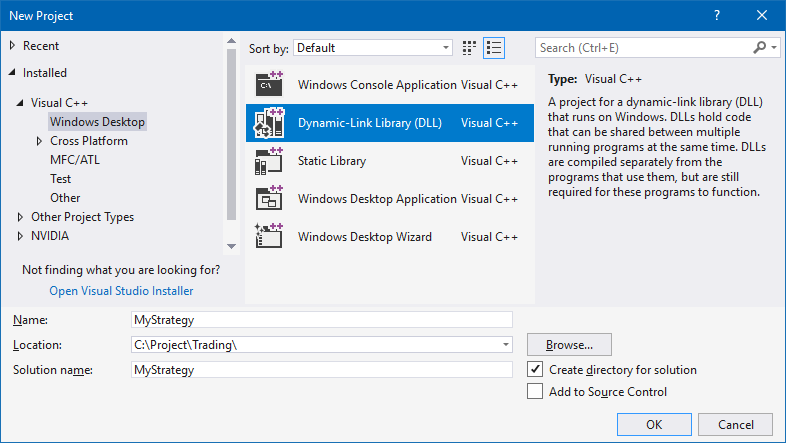
- VC++ will now create a folder with a new empty DLL project and
several .cpp and .h files. You need none of them. Check
the Source Files list in the Solution Explorer and
remove all .cpp files, like dllmain.cpp and
stdafx.cpp, from the project (right click >
Remove).
- Add two source files: your .cpp strategy from the
Zorro\Strategy folder, and ZorroDLL.cpp
from Zorro\Source\VC++
(Source Files > right click > Add> Existing Item).
ZorroDLL.cpp imports Zorro's function library and variables
to the DLL.
- Now set up the project properties. Right click on the project name in the
Solution Explorer and select Properties. First
choose the Platform: Win32
or x86
for the normal 32-bit Zorro version, x64 for the 64-bit Zorro. Then set the
following properties for all configurations:
- General / Advanced > Character
Set. Select Multi-Byte Character
Set. This causes Windows functions to expect text
strings in 8-bit ANSI, not in 16-bit Unicode.
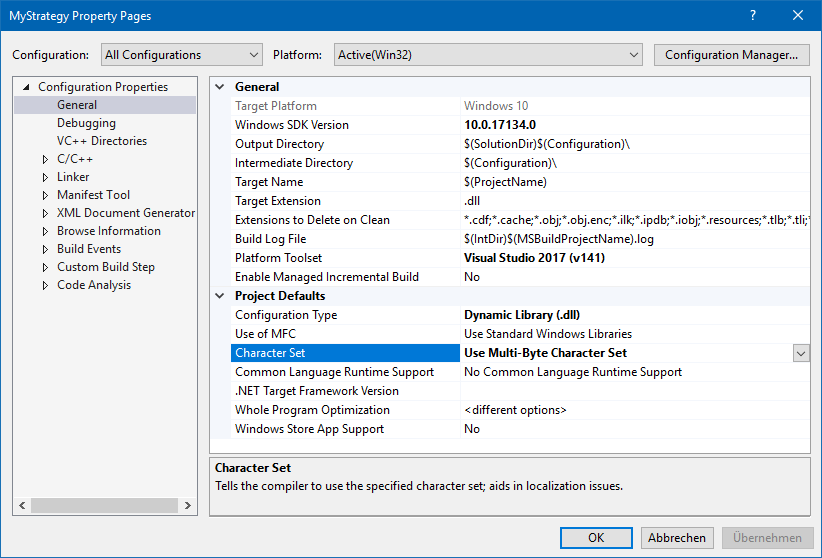
- General > Target Name. Enter here the name of
the .cpp script without extension. For a 64 bit target (compiled with the
x64
option) add '64' to the name.
- General > Output Directory. Enter here your
Zorro Strategy folder path where the compiled file is supposed to end up.
- General > VC++ Directories. Add your Zorro
include folder path to the VC++ Include
Directories. It contains zorro.h and other headers that your code needs to compile. Make sure
to add the folder at the end of the path list - not at the beginning! You
don't want to override the standard windows headers with the lite-C headers
in that folder.
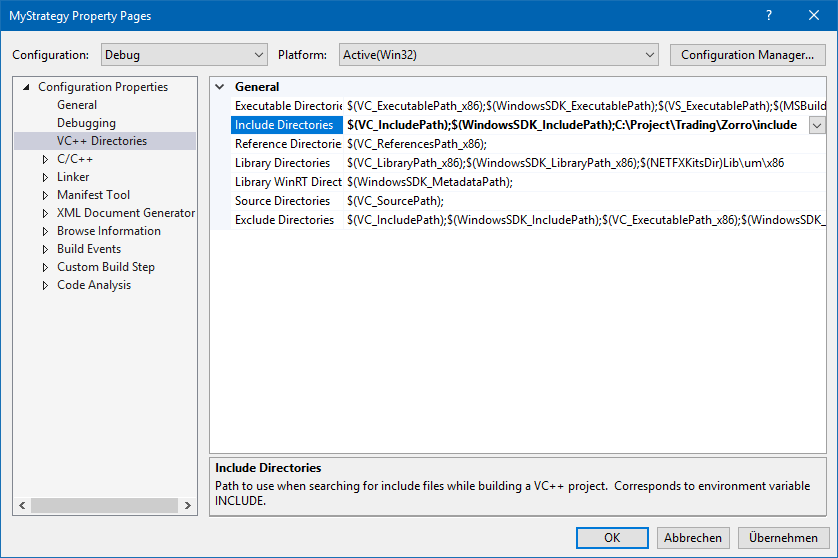
-
C/C++ > Code Generation. If you want to
distribute your strategy DLL to other people, change
the Runtime Library of the Release
configuration from Multi-threaded DLL (/MD) to Multi-threaded
(/MT). Otherwise people had to install the
VC++ Runtime Redistributable for using your strategy.
- C/C++ > Floating Point Model. Set it to
Strict for catching floating point errors.
- C/C++ > Precompiled Headers. Trading scripts
won't need them, so turn them off.
- For debugging your script with Visual C++, either run Zorro with
the compiled debug version of the DLL and select Attach To Process.
Or set up Command, Command
Arguments, and Working Directory under
Debugging as shown below, then start the debugger directly from
Visual Studio. For a 64-bit project, give the path to Zorro64.exe
under Command. The Working Directory
is always the Zorro folder.
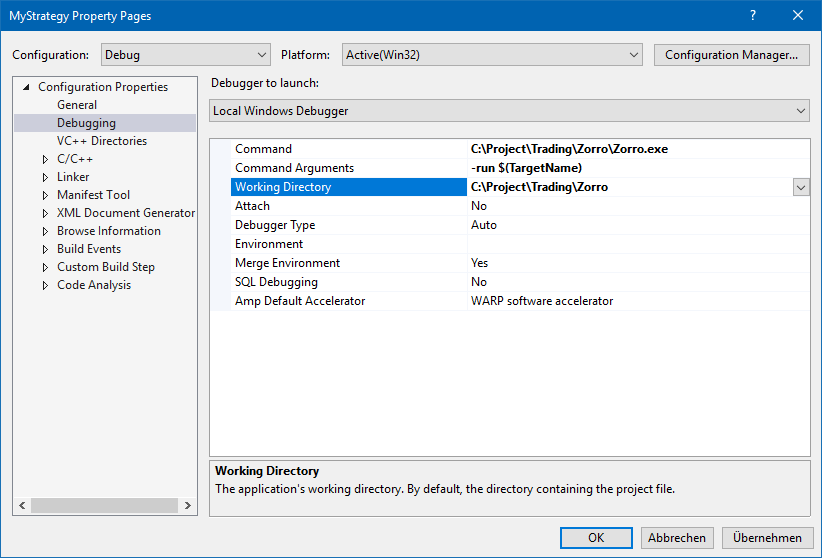
- Now you're all set to debug your strategy with Visual Studio. Always include
<zorro.h> and put the strategy code in a DLLFUNC
void run(). The zorro.h header has all needed variables
and function definitions. Functions to be exported by the DLL, especially user
provided functions such as run, tick,
evaluate etc, must be preceded with the DLLFUNC
macro. The calling convention is __cdecl. For debugging a system
variable, look into the header variables.h that contains all
system variable definitions and their equivalents in the g
singleton struct.
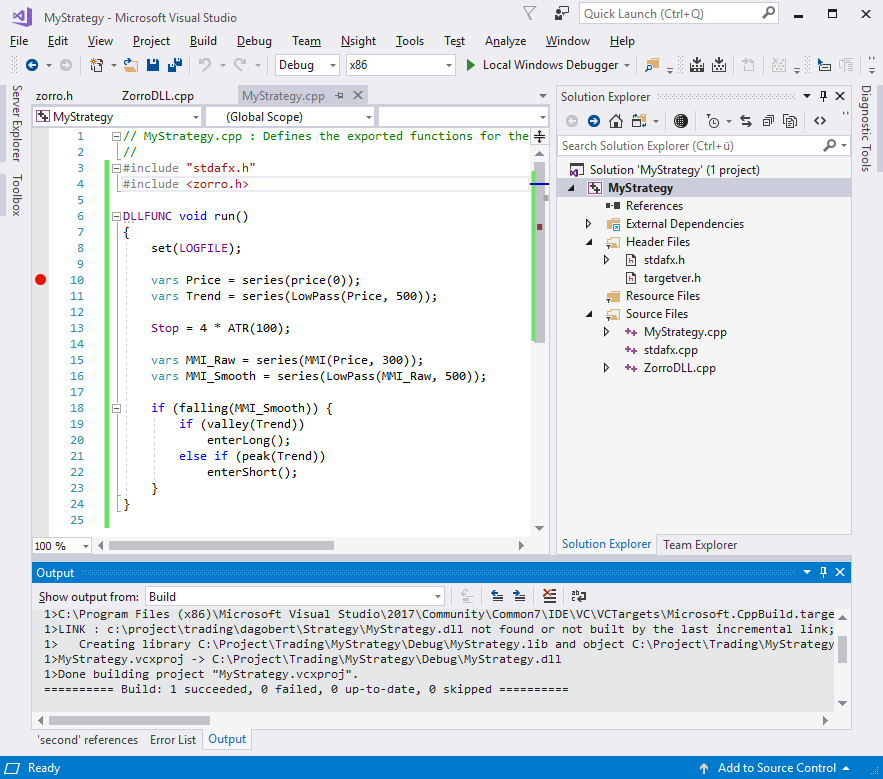
- Mistakes - for instance, a wrong compiler setup
- will cause Error 062 when starting the DLL. In that
case check your project for a correct setup.
- If a strategy DLL works on your PC, but produces Error
062 on another PC, the reason is most likely a missing module. Use a tool
such as Dependency
Walker for finding out which module is missing on that particular PC. If
the DLL needs VC++ runtime libraries, install vc_redist.x86.exe
or vc_redist.x64.exe.
- You can run a .cpp script either directly from Zorro,
or directly from the VC++ environment by clicking on the .vcxproj
file (Zorro S only). While developing the script, VC++ is
preferable, since it allows to immediately jump to lines with syntax errorr,
or to debug the code line by line. If the script includes further code that
you're working on, always use VC++. Zorro willl display syntax errors only
in the main .cpp script, but not in included code.
- When running a .cpp script that #includes other
scripts, make sure to compile again after changing something in an included
file. This is not automatically detected by Zorro, since it only compares
the timestamp of the main script. Clicking on [Edit]
always triggers recompilation.
- For avoiding header conflicts when using large external libraries, the
easiest way is packing the library in a separate DLL and calling it from
your script with LoadLibrary / GetProcAddress.
If you have a mix of lite-C and C++ scripts, we recommend to add a '+' to a
.cpp script name
for marking it in the scrollbox. Since .c overrides
.cpp, don't use the same name for both variants. The example file MyStrategy+.cpp contains C++ versions of
workshops and example scripts. Which one to compile can be selected
with a #define at the begin. Check it out for learning the differences of writing
a strategy in VC++ instead of lite-C. All known code differences are listed below.
If you encounter any other incompatility with a function or variable, please report
on the user forum or to Zorro support.
A template for a VC++ zorro project by a user is available on
https://github.com/szabonorbert/zorro-project-template.
See also:
API access, lite-C vs C++,
migration, engine API
► latest version online





